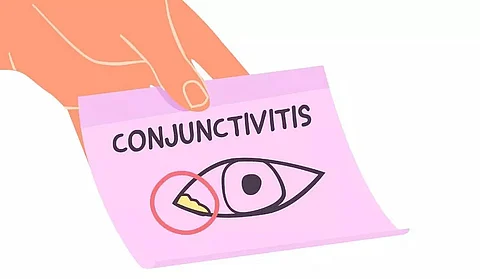
- Home
- Live Blog
- Breaking News
- Top Headlines
- Cities
- NE News
- Sentinel Media
- Sports
- Education
- Jobs

NEW DELHI: The humid climate during the monsoon months creates an ideal habitat for germs and viruses to spread conjunctivitis, commonly known as pink eye.
Against the backdrop of this upsurge in cases of conjunctivitis, the All India Institute of Medical Sciences (AIIMS) in Delhi is consistently recording around 100 patients daily.
Understanding the types: Viral, Bacterial, and Allergic conjunctivitis
Conjunctivitis is often characterized by redness, itching, and discharge from the eyes, caused by various factors. The three primary types of conjunctivitis are viral, bacterial, and allergic. Among these, viral and allergic variants are particularly highly contagious in nature. Close contact, such as sharing towels or handkerchiefs within families, can lead to rapid transmission, making it easy for one infected family member to pass it on to others. Understanding these modes of transmission is essential in combating the spread of conjunctivitis. This ease of transmission highlights the need for personal hygiene and caution.
Prevention: A shield for your eyes
Preventing conjunctivitis is a responsibility that rests upon us all. Some crucial steps can help us make a significant difference in safeguarding our eyes and those of our loved ones. Here are some fundamental preventive measures:
Personal Hygiene: Adhering to a regimen of excellent hygiene through frequent handwashing, particularly before any contact with your face or eyes, is a simple yet effective measure to minimise the chances of conjunctivitis transmission significantly.
Resist the itch: In case of itchiness, resisting the urge to rub your eyes vigorously is essential. Such actions can further spread the infection and worsen the condition. Instead, gently dab your eyes with a clean cloth and dispose of it properly.
Facial hygiene: Gently splashing your eyes with clean water several times a day can help soothe irritation and wash away potential irritants. Remember to dab the eyes gently with a clean cloth to avoid unnecessary friction.
Proper tissue disposal: Proper disposal of used tissues and other materials is essential to prevent contamination and the potential spread of infection to others.
Understanding the risks and the need for treatment
Although conjunctivitis is generally self-limiting and often resolves on its own within a week, seeking timely treatment is paramount for several reasons. Firstly, treatment can provide relief from discomfort caused by symptoms like itching, pain, and discharge. Secondly, prompt treatment can prevent potential complications. Vigorous eye rubbing during conjunctivitis can lead to corneal abrasions, which may result in partial blindness if left untreated. IANS
Also Watch: